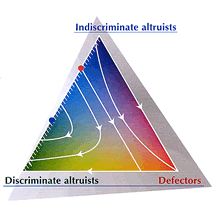 |
Evolution and Ecology Program |
| Evolution of Cooperation | |
| Overview • Illustrations • Publications |
| Overview |
More background information
IIASA has a long and renowned tradition of using tools from systems analysis for investigating conditions facilitating the evolution of cooperation. The resulting theories are currently enjoying great attention thanks to a new wave of research in experimental economics that uses them as null models. The new approach challenges the rationality assumption underlying much of classical game theory. Recent research advances at IIASA have shed new light on the role of reputation for the evolution of indirect reciprocity, the importance of voluntary participation for sustaining high levels of cooperation, the joint evolutionary dynamics of cooperation and mobility, and on the effect of rewards and punishment in public goods games.
Over the next few years, the Program will elaborate on the evolutionary
understanding of direct and indirect reciprocity in homogeneous and spatially
structured populations.
Detailed research
agenda
| Illustration |
 |
If defectors invade a mixture of discriminate and indiscriminate altruists along the hatched line, they are either eliminated straight away (below the blue point), or take over (above the red point), or (between red and blue point) experience a kind of Pyrric victory which leads back to a mixture of altruists which is immune against defectors. Hence, if defectors invade too often during the neutral wandering between discriminate and indiscriminate altruists, they will always be repelled. If, however, they wait with their invasion attempt for a long time, they may encounter a population that has wandered across the red point and which is no longer able to resist the invasion.
Therefore, if a population is challenged frequently enough by defectors, then cooperation can persist.
| Publications |
Responsible for this page: Melanie
Wenighofer
Last updated:
![]()